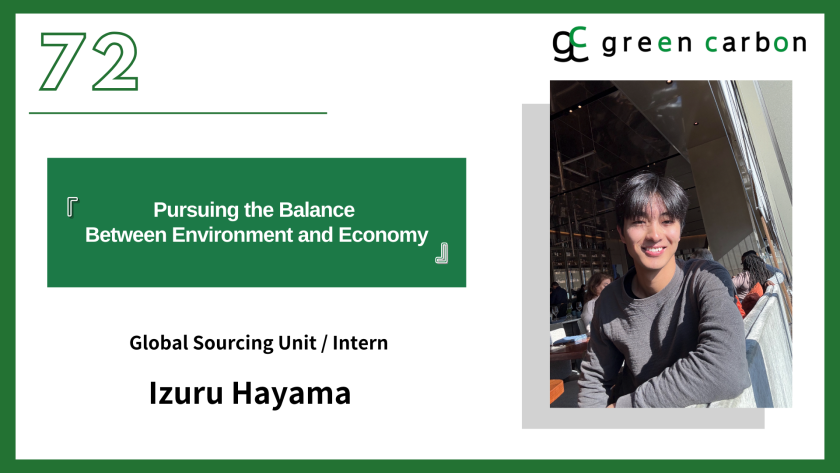Name : Izuru Hayama
Department/Position : Global Sourcing Unit
Area of Expertise/Assigned Duties:Data organisation and manual creation for local staff in the Philippines operation
University : University of New Mexico, the U.S.
Major/Studies : Economics (Environmental Economics) and Statistics
Reason for Joining Green Carbon : Because there was good compatibility between my field of study, environmental economics, and the business activities of Green Carbon.
Career Background : Born in Mie Prefecture, dropped out of Rikkyo University, transferred to the University of New Mexico after studying abroad there.
Hobbies/How I Spend My Days Off : Watching baseball (NPB, MLB)
Student Activities/Organizations : Mountaineering Club, Japanese Culture Club

Q. Please provide a brief self-introduction, including your career history to date.
I am Izuru Hayama, currently majoring in Economics and Statistics at the University of New Mexico in the United States.
After graduating from high school, I enrolled at Rikkyo University. However, during the summer of my second year, I spent a year as an exchange student at the University of New Mexico. Having been drawn to the environment here, I decided to transfer after my exchange period.
Upon entering university, when contemplating what I ultimately wished to study over my four years, I encountered environmental economics – a field examining the balance between environmental protection and economic development. I resolved to make environmental economics one of the pillars of my academic pursuits during my university years.
Subsequently, having harboured aspirations for study abroad even before entering university, and recognising that the University of New Mexico offered a more robust environment for studying environmental economics, I made the decision to study there.
Q. What prompted you to consider working at Green Carbon?
As I progressed in my studies of environmental economics, I became keen to explore the relationship between “environment and economy” from a business perspective. This led me to seek an internship within the carbon credit sector. My desire to work specifically at Green Carbon stemmed from its position as the most dynamic start-up within the carbon credit creation sector. Amongst its peers, it also has the most extensive international operations. I believed this would allow me to leverage my study abroad experience whilst experiencing the environment of a rapidly growing company with a small team, thereby contributing significantly to my personal development.
Q. What kind of work are you involved in? Please tell me about your duties.
During the initial phase of my internship, I conducted research on the rice market. Specifically, I began by investigating the question of why large-scale agriculture has not developed in Southeast Asia. This involved collecting, processing, and analysing statistical data on economic indicators related to rice (such as production volume, export volume, and import volume).
Subsequently, I became involved in the Philippine operations. This marked a significant shift from my previous research duties, with my primary tasks now being data organisation and creating manuals for local staff. While data organisation might sound like a task that requires little thought and could easily be replaced by AI, the Philippine operations were still in their infancy. Consequently, the methods for organising data had not yet been systematised. My role involved creating a prototype spreadsheet tailored to the staff’s requirements. This was a creative task, requiring me to devise the “system” – how data should be managed and organised to make it both easy to view and use.
Q. What gives you job satisfaction?
Working in a role highly compatible with environmental economics and being able to utilise the English skills honed through my study abroad experience within the overseas division, I find it rewarding to be at Green Carbon precisely because I am in an environment where I can achieve both.
Furthermore, the significant autonomy afforded to me means I am not merely following instructions but am given the opportunity to think for myself and take initiative, making this experience another source of fulfilment.
Q. What challenges would you like to take on in the future?
My interest in studying environmental economics stems from the question: “Can environmental protection and economic growth coexist?” While these two activities appear to be in conflict, I believe Green Carbon serves as a bridge between them. The carbon credit mechanism is a prime example of such bridging, yet I consider carbon credits alone insufficient to resolve environmental issues. So what is needed? Some argue that reconciling environmental protection and economic growth is fundamentally impossible within the current economic system. Nevertheless, at this stage, we must continue to seek the best possible solutions within existing frameworks. Faced with this complex question, I hope to persist in tackling it through two avenues: the business domain within Green Carbon and the academic domain within the university, navigating the twists and turns along the way.
Q. Finally, a message for those wishing to work at GreenCarbon
At Green Carbon, we work together beyond the boundaries of employees and interns, united under the vision of “saving the planet through the power of life”. Having significant autonomy in our work means a commensurate level of responsibility. However, we are supported by a team of colleagues who share this commitment. We look forward to meeting like-minded individuals who wish to grow by overcoming challenging problems and create meaningful change in society.

